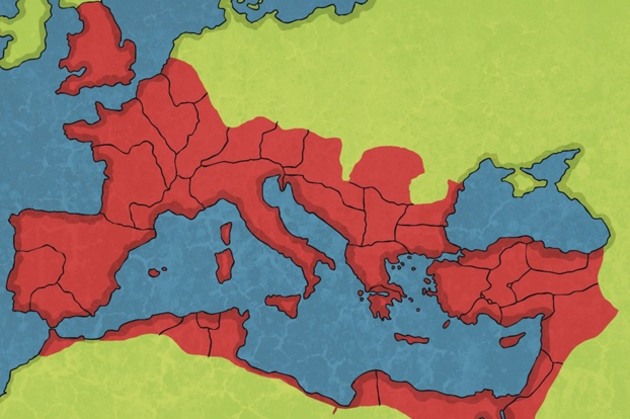

Looking to improve your Roman history? This Teaching Wiki has everything you need to know about Julius Caesar's timeline, from his rise to power to his death and legacy.

Gaius Julius Caesar (12 July 100 BC – 15 March 44 BC) was an important Roman general and politician who played a crucial role in the fall of the Roman Republic and the birth of the Roman Empire. Caesar is one of the most famous and easily recognized names in the history of Ancient Rome, both due to his remarkable career, and his shocking assassination in the Roman Senate House on the 15th of March in 44 BC.
A detailed Julius Caesar timeline can be created from the historical texts of Ancient Rome. Many writers and storytellers documented the lives of Roman emperors. However, a timeline of Julius Caesar's life before he entered into politics is less easy to put together.
It is known that Julius Caesar's timeline included becoming a high priest of Jupiter at a temple in Rome, he later married a woman named Corneilia Cinna, and was even kidnapped by pirates!
After the assassination of Julius Caesar, Rome was thrown into a series of vicious civil wars which ended with the downfall of the Roman Republic, and many of the senators who murdered Caesar were assassinated themselves.
Gaius Julius Caesar was born in Rome in 100BC, into a patrician family. His father, who was also called Gaius Julius Caesar, died when the future dictator was just 16, leaving him as the head of the family at a very young age. This was a chaotic period in Roman history, since the Republic had been temporarily overthrown by the dictator Sulla, so Julius' early career involved a lot of changes. He joined the army to get away from the chaos of Rome, where he thrived, then began to build a political career after Sulla's retirement and death.
However, Julius Caesar really came to prominence when he ran for the position of Consul against two other opponents in 60 BC. The political race was filthy, with huge amounts of bribery and corruption being recorded, but Caesar ultimately won, alongside a conservative candidate called Marcus Calpurnius Bibulus.
Caesar had been sponsored by one of the wealthiest and most politically influential men in Rome, Marcus Licinius Crassus, and now he forged an alliance with Gnaeus Pompeius Magnus, commonly known as Pompey. Pompey was a celebrated general with a lot of political clout of his own, and the three men had enough money and political influence between them to control public business. This informal alliance between the three men was called the First Triumvirate, and it was cemented when Pompey was married to Caesar's daughter, Julia. By doing this, Caesar created an extremely powerful political bloc that allowed him to essentially rule Rome as one of three dictators, although he was still officially only an elected official for a year.
When his year in office ended, he was given governorship over a massive amount of territory thanks to his political allies, gaining control over Cisalpine Gaul (Northern Italy), Illyria (South-Eastern Europe), and Transalpine Gaul (Southern France). He was also able to get his period of governorship extended from one year, to five. This was extremely important because he couldn't be prosecuted for the many laws he'd broken until his governorship ended!
After Caesar moved out to Transalpine Gaul, in what is now Southern France and Germany, he decided to rapidly increase his personal wealth and his power in Rome by declaring a war of conquest against the Germanic tribes who lived in this region. The Gallic Wars began in 58 BC, and Caesar was able to rapidly expand the Roman Empire during this period. Although the Germanic tribes were roughly equal in power to the Roman legions that Caesar brought with him when they were working together, they were divided up into smaller clans, many of whom were already at war with each other, and it was difficult for them to get organized into a disciplined army large enough to truly crush the Romans, although they were a formidable enemy.
In 56 BC, the three members of the Triumvirate renewed their alliance and divided up the provinces of the Roman Empire between them. Caesar would remain governor of Gaul, Pompey would get control of Hispania (modern-day Spain and Portugal), and Crassus would gain control of Syria (modern Syria, although the borders have changed over the centuries). This was the peak of the Triumvirate's power: with his control over Gaul made more secure, Julius Caesar began the first Roman invasion of Britain in 55 BC, although he was quickly pushed back. He made a second attempt the next year, in 54 BC, but trouble back in Gaul forced him to abandon Britain for good.

The First Triumvirate was never going to last, since it wasn't actually a very stable alliance. Although Julius Caesar, Crassus, and Pompey were all willing to work together, it was because they all wanted to gain greater power for themselves, rather than because they shared political ideals and ambitions. Although the triumvirate held together as long as the three members were equally balanced and stood to gain more power by working together than by turning on each other, sooner or later, it was always going to fall apart.
While Caesar had been away in Britain, his daughter and Pompey's wife, Julia, had died in childbirth, and relations between the two men began to turn sour. Meanwhile, Crassus had been trying to match Caesar's successes in Gaul with his own military campaign in Syria, and he was killed in 53 BC, bringing the Triumvirate to an unofficial end.
After the Battle of Alesia in 52 BC, where Rome finally gained full control of Gaul (modern France and Belgium), there was a brief period of calm before Caesar's governorship officially ended in 50 BC. However, when Caesar was called back to Rome because his governorship had ended, he refused to go, fearing that he'd be arrested if he went back to Rome without the legal protection of being a governor. Because of this, he was charged with insubordination and treason by Pompey. However, Caesar crossed the river Rubicon, which marked the border of Italy, with armed forces on the 10th of January 49 BC. This was an obvious declaration of war, and given Pompey's long history of military prowess, he was elected the leader of the pro-Republican armies.
The Civil War between Pompey and Caesar was extremely bloody, and it ended in Pompey's defeat at Pharsalus in 48 BC. Although Pompey managed to flee to Egypt at this point, Caesar had already achieved what he wanted. In 48 BC, he was appointed Dictator of Rome and made Mark Anthony his second-in-command, before chasing Pompey to Egypt. On his arrival, Julius Caesar was presented with Pompey's severed head and seal-ring, officially ending the Civil War.
It's hard to know for sure whether Julius Caesar was a truly good leader after generations of propaganda, but there are some pointers that we can use to try and get a picture of him as a ruler. We know that Caesar was a very skilled soldier and general, given his enormous success during the Gallic Wars, and this was highly respected in Rome, so this would have helped him to gain initial support with the Roman military.
What's more, Julius Caesar didn't initially make any powerful enemies in Rome. Unlike older Roman dictators like Sulla, he pardoned all his enemies when he came to power, and he arranged massive public gladiatorial games to celebrate his successes in Egypt and in the Roman provinces, earning him wide-spread popularity. However, he also began centralizing and consolidating power in a single unified block, laying the foundations for the Empire that was to come.
As Caesar's grip over the Roman world strengthened, the Roman Senate became increasingly concerned. Rome had seen dictators before; the Senate would even elect them to lead during times of crisis. The difference was that those dictators returned power to the senate once the crisis had passed. Caesar had different ideas.
The Senate worried that Caesar would renew his dictatorship again and again without end. This would make him the highest power in the empire, he would become the emperor of all Rome.
The Roman Senate were right to be concerned. In February 44BC, Caesar declared himself Dictator for Life- the dictator perpetuo- and began to strip away power from the Senate.
It was at this point that a conspiracy was formulated, a plot to kill Caesar before he was able to end the Republic completely. 40 Senators were involved in total, led by Cassius and Brutus (who had previously been close allies to Caesar).
On the 15th of March 44BC, Caesar entered the Senate, where he was mobbed by the conspirators. The first attack was issued by Brutus, who stabbed the dictator in the back. Caesar cried out his final words to his friend and murderer.
Et tu, Brute?
The other senators joined in, and Caesar fell on the senate floor. This ended his reign as emperor of Rome.
Unfortunately, the senators' plan to save the Republic by killing the 'would be' emperor backfired badly. Rome was left in a power vacuum following Caesar's death, and a civil war soon broke out. On one side, Marc Anthony (Caesar's second-in-command) and on the other, the leaders of the assassination. Ultimately, Anthony defeated the senators and a new Triumvirate was formed between Marc Anthony, Caesar's great nephew (Octavian), and Caesar's military commander, Lepidus.
The new Triumvirate did not last long, as an argument drove Marc Anthony and Octavian to take up arms against each other. After years of bloody fighting, Octavian was the victor. He renamed himself Augustus and became the first Roman Emperor in 30 BC. This ended the Roman Republic for good.
Julius Caesar was remembered as a hero of the Empire and was deified as a god. In comparison, the conspirators were exiled, killed or committed suicide.
Caesar was the first resident of Rome to be deified and so honoured with a temple in his commemoration. The Temple of Caesar or Temple of Divus Iulius was constructed in the Roman Forum of Rome, Italy, located near the Regia and the Temple of Vesta.